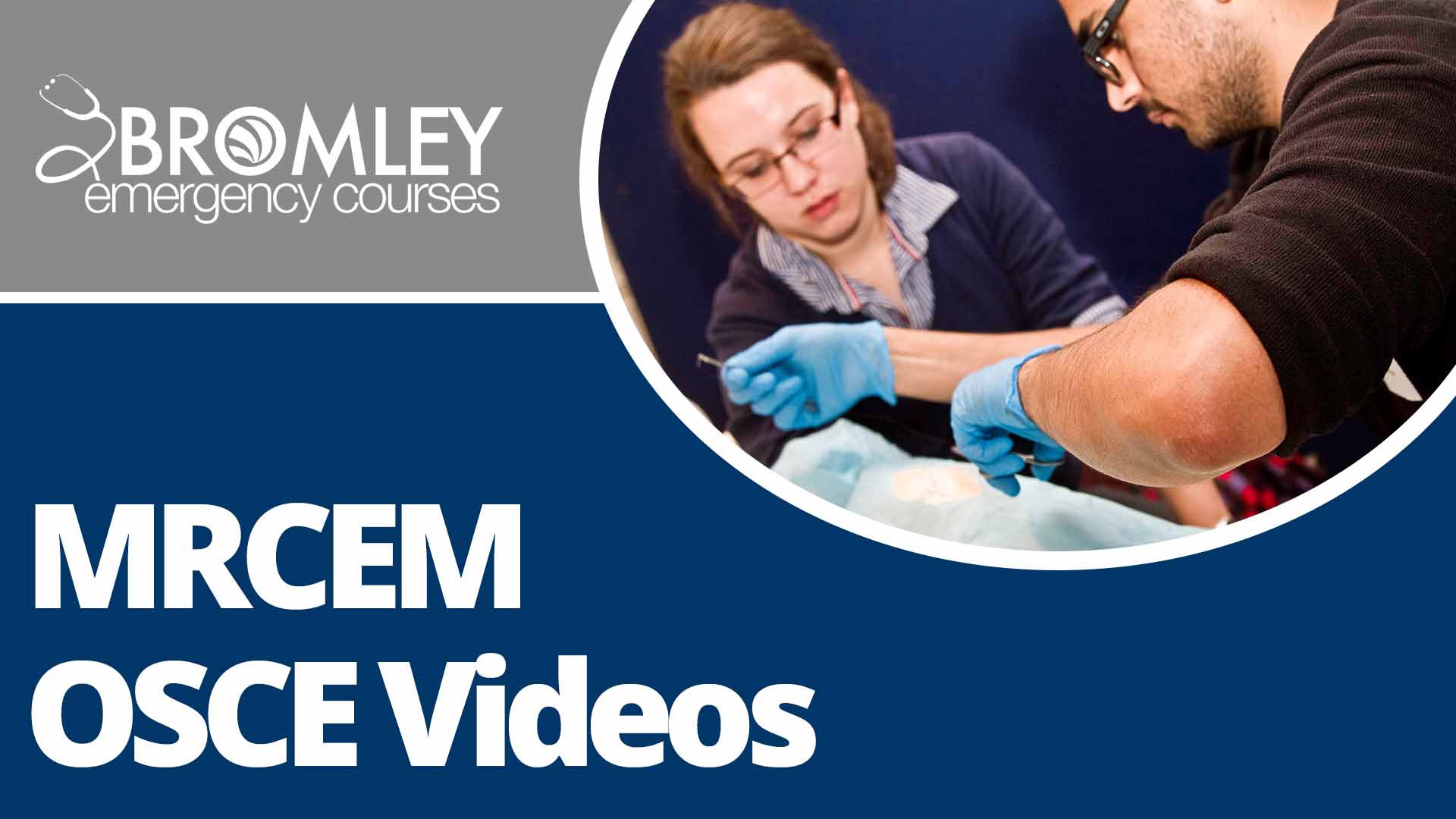MRCEM OSCE Exam Information
The MRCEM OSCE (Objective Structure Clinical Examination) is a pivotal step in achieving Membership of the Royal College of Emergency Medicine, serving as the third and final exam in the qualification process.
This examination rigorously assesses the clinical and communication skills of trainees, ensuring they meet the standards necessary for higher training in emergency medicine. It evaluates the common competencies and clinical competencies required for the assessment and immediate management of common clinical conditions seen in the Emergency Department in adults and children.
Dates, Locations and Fees
MRCEM OSCE exam dates 2025 and 2026
| Exam Date | Centres | Application Window | Results Date | Preparation Courses & Online Resources |
|---|---|---|---|---|
| 1 – 12 December 2025 | London | 3 – 10 September 2025 | 28 January 2026 | MRCEM OSCE Videos |
| 19 – 30 January 2026 | London | 16 – 23 October 2025 | 10 March 2026 | 2-day in-person MRCEM OSCE Course: 8th – 9th January 2026, 10th – 11th January 2026, 14th – 15th January 2026 1-day online MRCEM OSCE Course: 13th January 2026 MRCEM OSCE Mock Exam: 16th January 2026 MRCEM OSCE Videos |
| 23 – 27 March 2026 | India – Hyderabad | 26 November – 3 December 2025 | 8 May 2026 | 1-day online MRCEM OSCE Course: tbc MRCEM OSCE Videos |
| 27 May – 11 June 2026 | London | 11 – 18 March 2026 | 23 July 2026 | 2-day in-person MRCEM OSCE Course: tbc 1-day online MRCEM OSCE Course: tbc MRCEM OSCE Mock Exam: tbc MRCEM OSCE Videos |
| 20 – 24 July 2026 | India – Chennai | 8 – 15 April 2026 | 4 September 2026 | 1-day online MRCEM OSCE Course: tbc MRCEM OSCE Videos |
| 3 – 19 November 2026 | London | 5 – 12 August 2026 | 6 January 2027 | 2-day in-person MRCEM OSCE Course: tbc 1-day online MRCEM OSCE Course: tbc MRCEM OSCE Mock Exam: tbc MRCEM OSCE Videos |
The MRCEM OSCE is delivered in London (UK), Kuala Lumpur (Malaysia), Chennai, Hyderabad, Mumbai and Kochi (India). For updates on exam dates, refer to the RCEM Examination Calendar.
MRCEM OSCE Exam Fees 2026
The MRCEM OSCE fee depends on the location where you plan to take the exam and your membership status.
| Location | Membership Category | Exam Fee 2026 |
|---|---|---|
| United Kingdom | Member | £586 |
| United Kingdom | Non-member | £695 |
| India | Member | £987 |
| India | Non-member | £1,186 |
| Malaysia | Member | £1,121 |
| Malaysia | Non-member | £1,345 |
MRCEM OSCE Eligibility and Oversubscription Criteria
Eligibility for the MRCEM OSCE is contingent on passing the MRCEM Primary and MRCEM Intermediate SBA (or equivalent) exams, along with a minimum of 24 months of post-qualification experience, including at least six months in Emergency Medicine (post FY1/intern level).
Candidates have to hold a medical qualification approved by the General Medical Council (GMC) and have completed the UK Foundation Programme or equivalent (electronic evidence required at the point of application).
There is a limit to the number of available OSCE spaces per examination diet. If an examination diet is oversubscribed, the following criteria will be applied:
• Candidates in a GMC-approved UK ST3 training post
• Candidates in year 3 of approved Irish training programme
• Candidates holding an employment contract with the NHS (which covers the examination date)
• Candidates who were not allocated a place at the most recent sitting (on a first come, first served basis, if required)
• All other candidates on a first come, first served basis
You can expect to know if you were allocated a place in approximately three weeks after the application window has closed.
MRCEM OSCE Stations
The MRCEM OSCE consists of 16 stations, each lasting 8 minutes, with an additional minute provided for reading between stations. Two rest stations are also incorporated into the exam.
The stations cover the following scenarios aligned with the Emergency Medicine 2021 Curriculum.
| N | Station | Specialty Learning Outcome (SLO) |
| 1 – 3 | Complex stable patient | SLO1 |
| 4 – 5 | Answer questions | SLO2 |
| 6 – 7 | Resus | SLO3 |
| 8 – 9 | Injured patient | SLO4 |
| 10 | PEM | SLO5 |
| 11 – 12 | Procedural skills | SLO6 |
| 13 – 14 | Complex challenging situations | SLO7 |
| 15 – 16 | Supervise & teach | SLO9 |
Successfully passing at least one of the two resuscitation stations is imperative. Regardless of your performance in other stations, failure to clear at least one resuscitation station will result in an overall failure.
How is the MRCEM OSCE exam marked?
The MRCEM OSCE is marked using domain-based marking, assessing candidates across seven domains (skills expected to be demonstrated):
1. Clinical reasoning/ decision making
2. Practical/ pinnacle skills
3. Communication skills (incl. conflict)
4. Teaching skills
5. History taking/ information gathering
6. Organisation/ prioritisation
7. Clinical examination skills
Up to four domains will be tested in each OSCE station, with each domain separately weighted in relation to its overall importance within the station. Each station question will have a pie chart to let you know which of these domains will be tested and the percentage of marks it carries.
The MRCEM OSCE pass mark will be determined using the Borderline Regression Method. An additional standard error of measurement will be added to this cut score to calculate the final passing score.
Candidates will be assessed by the examiner, who will form a judgment on the level of competence they display in each domain/skill, ranging from well below the minimum level of competence to well above for each domain in each station.
Candidates will receive a calculated numerical value for each domain, resulting in a score ranging from 0 to 10 for each station. With a total of 16 stations, the maximum achievable score for the entire exam is 160 marks.
Results for the MRCEM OSCE will be available to candidates via their RCEM website account approximately five weeks after the examination date, with publication scheduled on a pre-advised day.
The average pass rate for the MRCEM OSCE exam is relatively high; for example, in 2023, it was 86%, according to the RCEM Exam Pass Rate Data.
MRCEM OSCE Exam Preparation
If you want to test your clinical knowledge and skills in exam-like scenarios before the actual exam, you can join our 2-day in-person MRCEM OSCE course in London. The course consists of around 40-50 different OSCE stations with 1 minute for reading, 8 minutes to complete each station, and a 5-minute feedback session with our experienced faculty after each one. You will sit in all stations, sometimes taking the lead, other times watching and learning from others who take the lead.
If you are unable to travel or prefer to study from home, check out a 1-day interactive online MRCEM OSCE course. It consists of around 20 different OSCE stations drawn from SLO1 (Complex Stable Patient), SLO2 (Answer Questions), and SLO7 (Complex Challenging Situations). During the course, you will be practising communication skills, history taking, and more, with professional actors and getting feedback from our faculty members. For a more affordable option, you can also choose our 2-hour online MRCEM OSCE practice session, designed to offer focused preparation at a lower cost.
We also offer a 3-hour in-person mock MRCEM OSCE exam session. It consists of 16 OSCE stations and two rest stations, just like the actual exam. It’s designed to help those coming up to the MRCEM OSCE who have never had the experience of undertaking a full rotation and want to be sure that they can handle the timings, can move between very different scenarios and can bring the knowledge and skills to mind quickly when needed. This session does not include personalised faculty feedback.
When you book either an in-person or online MRCEM OSCE course, you’ll get 6-months free access to our MRCEM OSCE videos, updated in accordance with the changes made to the exam in 2022. These videos are designed to provide you with examples of the correct approach to any station you might receive in your exam. If you want to access them without attending a course, you can do so by purchasing the monthly online resources subscription.
You can also join our MRCEM OSCE Telegram group where you can find free sample OSCE videos and tips on how to prepare for the exam and will be able to engage with other candidates.
You can find out more about the exam in this MRCEM OSCE information pack.

Sign up to receive a free MRCEM OSCE Exam Preparation Resource.
*By proceeding you may be contacted via email with updates on courses and events by Bromley Emergency Courses. You may unsubscribe from these communications at any time. We will never share your details with 3rd parties and will only use your email to send you information about our upcoming courses and other offers.




